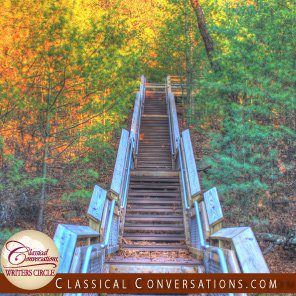“Education is the most powerful weapon which you can use to change the world.”
–Nelson Mandela
When I first came across this quote it begged me to ask, “Why?” I believe that a good education is necessary. Now as a student in the Rivendell Sanctuary Honors Program in Bloomington, Minnesota (A Minnesota Campus of San Diego Christian College), I am learning to change the world, and in order to do that I have to discard trivial things such as my self want and seek the essentials of truth, goodness, and beauty.
Now, my journey through education has been a process to say the least. Since I was very young, I was homeschooled along with my two siblings, Caleb (fourteen) and Emily (sixteen). Two or three years into homeschooling, a friend introduced us to a homeschool community which was just starting up called Classical Conversations. I was about seven years old when I first met Mrs. Leigh Bortins at a small church somewhere in Greensboro. I enrolled in a Foundations class and began my journey.
During the Foundations phase of Classical Conversations I memorized everything from Karl Linnaeus’s scientific classification system to catchy history songs. My siblings and I would chant prepositions, rattle off timeline cards, and memorize various countries around the world depending on the Cycle of Foundations we were currently in. At home, we would drill each other in the different subjects and prepare for our Memory Master tests. Foundations memorization techniques still follow me to this day, I find learning the vocabulary for a subject easy. For instance, during each subject here at Rivendell Sanctuary Honors Program we have required vocabulary that we must learn in order to participate in the thoughts of greats such as Plato, Aquinas, Augustine, Descartes, Kant, and so on, and thus far I have acquired the required vocabulary with ease.
As I moved into the Challenge program, I started to develop my work ethic along with time management skills. My experience in the Challenge program is one I look back on with a smile; all the projects we were assigned were difficult, but rewarding. Mock Trial was a definite highlight for me, even though we lost in the first round!
During Challenge II, I overcame my fear of dissection and was able to appreciate the intricacies of created life. Before this experience, I was blinded by trivial preferences and once I was pushed to overcome them, this exercise revealed an entirely new beauty in created things. Also in Challenge II I was encouraged to strengthen my writing, which had long been a point of tension in my prior education. Triviality would have me believe that writing was a pointless exercise, but the essential knowledge revealed through Challenge II showed me that writing was a new vehicle to perpetuate truth! When I arrived at Challenge III I really began to notice the fruits of the program, as well as its progressive advance into my personal life. During school time I was studying and reading, but in my spare time I would find myself engaged in meaningful conversation with friends and family. By the time I reached Challenge IV the program was complete. Every day that I went to class was a joy, no matter what class we were in: theology, math, history, science, Latin, or literature.
Around the time I was finishing up Challenge IV, the dichotomy between my educational time and personal time had become nonexistent. My education had become part of who I was; suddenly, my “other things” time and “school time” blended. Education became a passion; it became something I did because I loved it not because I had to do it.
All in all, the Classical Conversations program was masterfully crafted and I have benefited greatly from the program in personal and educational circles. In this program I made some of the closest friends I could hope for. As I progressed through the program my personal time became more about discovering truth with friends and family. Sometimes I would just sit outside to watch the sunset and philosophize, or I might even make assertions about morality in history on an afternoon run with my good friend, Austin Garmer. Being able to distinguish trivial from essential is a vital part of living. A life in the trivial will never arrive to a place of beauty and wholesome fulfillment, whereas a life in pursuit of the essential will rejoice. Classical Conversations, along with my parents (Love you, Mom!), provided a wonderful environment for growing my discernment and ability to think theoretically and critically today. Obviously, I am by no means a master at any of those things, but I have the capacity to be, and that is due to my homeschool education.
Today, besides being cold all the time in minus-fifteen-degree weather, this school prides itself in both academia and students of character. Having come through Classical Conversations I find that the workload is challenging, but manageable, and having the capacity to think theoretically and critically has allowed me to participate in class discussions to the fullest extent. While some are caught in the trivial others have surpassed the trivial and reached for the essential lessons hidden in Euclid’s Elements or Plato’s Meno. The environment of my education through high school endowed me with a thirst for the essential knowledge of life. However, even to this moment as I reach for my tea, I find myself wondering what knowledge is really essential and what the power of truly essential knowledge is? Maybe all these questions are a product of my inner Hume*. Nevertheless, I truly want to make an impact in this world, because I believe these questions are essential. Truth, goodness, and beauty are what we are called to pursue as followers of Christ, and only through espousing the essential can this world be shown the true, the good, and the beautiful.
______________________________
* For more information about David Hume (philosopher, historian, and essayist) go to:
http://www.britannica.com/EBchecked/topic/276139/David-Hume




